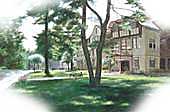Summer
2006
The
Loving Father
Pinecrest graduate
Pastor Julie A. Grove
The 15th chapter of Luke portrays a powerfully beautiful description
of our Lord’s character and His pursuing love for all
people. The message remains the same today. The story begins
with the statement, “And He said, a certain man had
two sons.”
Although the younger son’s request to receive his part
of the inheritance was not unlawful, it was an insensitive
and uncaring gesture toward his father’s generous and
loving heart. It was evident by his calloused statement, “Give
me” that his focus was only on the benefits due him
as a son. This son failed to understand that there are no
benefits outside the household. He did not understand the
depth of his father’s love.
He failed to understand the true meaning of the relationship
he had with his father - the protection, position, and privilege
that came from being a member of his father’s house.
This young son chose the wealth, but he missed the true richness
of belonging to such a loving and giving household. The good
news in this wonderful story is that the son “came to
himself.”
What a magnificent statement made by Jesus to those who reject
or left their father’s care, and the wonderful realization
that they are accepted and lavished with the love and care
of the Heavenly Father. The fact that regardless of the past,
the poverty, the want, the things they had joined themselves
to, the heart of the Father remains one of faithful, committed
love; arms ever extended to receive and restore these to His
household.
Passion in the heart and voice of Jesus was very evident
as His gaze met the eyes of each listener. He knew their displaced
thoughts and feelings, and felt their shame and unworthiness.
Jesus’ words were filled with tenderness. He longed,
and still longs for people to understand their acceptance
into the Household of Heaven.
The younger son, who lived in willful independence of the
father; a place of carelessness and sin, would find himself
in a new place … a place of want, hunger and weakness.
Having his father’s name was not enough to sustain,
uplift, encourage and feed him. It required being IN the household
and living under the umbrella of the father’s love and
care.
“And when he came to himself…” is such
a definitive statement on so many levels. First, realizing
in his heart, “this is not who I am,” he said,
“I will arise.” This is the same son who is faint
and weary, lacking the strength to go on, yet, there is something
in him that gives him strength to rise up and go home.
In the midst of our sin and inability to arise, a simple
cry of repentance opens the benefits of the Household. He
suddenly had strength to return, the wisdom to know where
he truly belonged, and the understanding of a father who would
accept him rather than cast him out. His heart changed from
an attitude of “give me” to a cry of “make
me.” He remembered his father’s gentle care and
understood for the first time not only the benefits of the
household but the unconditional love of his father.
After what must have felt like an eternity, the day arrived.
The father, with an unchanged love for his son, looked toward
the gates once again and from a distance recognized his broken,
prodigal son. Without hesitation or regard for his position,
he began to run. Fathers do not run, especially after rebellious,
heartless sons; but this father did. He must get there before
those in the city gates declare him an outcast.
The son, rehearsing his plea, knowing that even the servants
were cared for by his father, sees his daddy running. “My
father is running!” Then, before he can finish his next
thought, the younger son feels the strong embrace of his father;
the kiss on his neck and the tears of love and forgiveness.
Before he can finish his plea, his father calls the servants
and begins the process of restoration. There was no, “I
told you so” or “What were you thinking”
or “Do you know how much this cost me?” There
was only celebration. This is one of the most beautiful displays
of mercy and grace in Scripture.
We now shift our attention to the third point of reference,
the elder brother. His benefit as the oldest son was a double
portion of inheritance and the responsibility to emulate the
father in the household. He was to care for the details of
the household just as the father would care. We find this
son in the field working, being dutiful. Suddenly he hears
music, laughter and celebration. It was possibly a sound that
had not been heard since his younger brother had left. He
wipes the sweat from his brow as he curiously walks toward
the house. Stopping a servant, he inquires as to the celebration
taking place.
Rage replaced curiosity as the elder son heard the excited
servant speak of the “lost” son that was “received”
with such fanfare by the father. His steps cease in utter
disbelief that this “outcast” would be embraced.
His anger revealed his lack of “father heart and character.”
His response unveils that his motive was duty, not relationship.
It reveals his disregard for his father’s heart and
his lack of compassion for his younger brother. Pride shows
its ugly head as the elder son relates his perfect record
and his “right” as a son to have the things that
were now being given to an “undeserving” son.
He further reveals his heart by disassociating himself from
his brother, replying to his father, “This, thy son.”
The amazing eloquence of Jesus in this story to reveal the
true nature of the scribes and Pharisees, and yet include
them in His call to relationship with the Father is such a
powerful lesson to the church today. How often do we as Christians
disqualify the “lost” in our arrogance of spirituality?
Do we exemplify the character of the household or do we stand
in judgment and criticism of the “younger brother.”
I especially love the response of the father toward the elder
brother. First, he reassures his son of his placement in the
household and attempts to restore relationship with his brother
by saying, “This, your brother.” He then makes
a statement to his elder son that is one of the most beautiful
and picturesque statements in the Bible, “All that I
have is yours.”
This parable speaks as loudly today as it did when Jesus
spoke it to the publicans, the sinners, the Pharisees and
the scribes. I find myself gleaning from each point of reference
at various times and in different situations. When I feel
as an outcast or have joined myself with that which is foreign,
I hear the gentle voice of Father calling me home. When my
heart is critical and cold, or when I want to judge and disqualify
the unlovable, I see Father and the love in His eyes, not
only for me, but for the entire world, and this brings me
humbly to my knees. The greatest point of reference is the
Loving Father.
“He, who has ears to hear, let him hear.”


